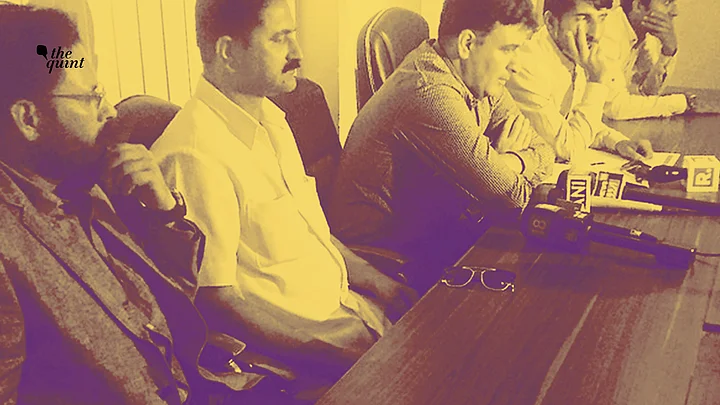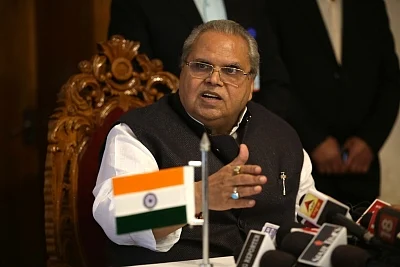As part of a major change for its bureaucracy, civil administration and police, the erstwhile state of Jammu and Kashmir would be breaking into two Union Territories (UTs) by the end of October with the appointment of its first Lieutenant Governor (LG).
For now, the termination of all five advisors to the Governor appears to be certain even as nothing is clear about the fate of Governor Satya Pal Malik.
Mr Malik, according to highly placed bureaucratic and political sources in New Delhi, would be meeting Prime Minister Narendra Modi on Monday. He is understood to get a sense of whether he would be asked to continue as LG after 31 October, or given a different state. According to sources, over a month back, Mr Malik was interested in a western state which has now got a new Governor.
Malik, 2 Advisors Among Frontrunners
If these well-placed sources are to be believed, only one LG, with his office in Srinagar and Jammu, would administer both the newly created UTs.
Several retired bureaucrats, Army Generals, intelligence chiefs and politicians are believed to be among the aspirants for the post. Those in consideration, after Mr Malik, include the incumbent Advisors to Governor K. Vijay Kumar and Farooq Khan.
One of them is strongly backed by Minister of Defence Rajnath Singh and National Security Advisor (NSA) Ajit Doval, while another is believed to be a confidante of the all-powerful Home Minister Amit Shah.
Kumar has extensive experience in dealing with the insurgencies and armed gangs in the south whereas Khan has the distinction of being the only advisor who has been a member of BJP after his retirement from the rank of Inspector General of police in J&K.
He also happens to be the founder of the Special Operations Group (SOG) of the J&K police and is believed to be responsible for the killing, surrender and arrest of over 2,000 militants and their over-ground workers. His term as the Administrator of Lakshadweep was cut short in July this year when he was shifted to his home state and appointed as Governor Malik’s fifth Advisor.
Misra Emerging As The Dark Horse
In case of Mr Malik’s disinclination to continue in J&K and a tie between Kumar and Khan, PM Modi’s most trusted aide, Nripendra Misra, could emerge as the dark horse.
A 1967 batch IAS officer of the Uttar Pradesh cadre, Misra has served as the Principal Secretary to PM Modi from May 2014 to August 2019. Seventy-four-year-old Misra resigned last month even as he had been re-appointed to the prestigious position on 11 June 2019, with the status of a Union cabinet minister. His second appointment was, by order, co-terminus with PM Modi’s term.
In influence, Misra is rated parallel only to H.N. Haksar and Brajesh Mishra, who served as principal secretaries respectively to prime ministers Indira Gandhi and Atal Bihari Vajpayee.
After his retirement from the IAS in March 2005, Misra served as the chairperson in the Telecom Regularity Authority of India (TRAI). During his long career in bureaucracy, he served as Principal Secretary to the UP Chief Ministers Mulayam Singh Yadav and Kalyan Singh. With post-graduate degrees in Chemistry, Political Science and Public Administration from John F. Kennedy School of Government, Harvard University, Misra also served a tenure as Minister (Economics) at the Indian Embassy in Washington D.C between 1985-88.
PMO Chief’s Unexpected Resignation
Sources revealed to The Quint that Misra’s sudden resignation on 30 August came after a series of discussions with PM Modi over the scrapping of the Article 370 and 35-A and the division of the state of Jammu and Kashmir into two UTs, with a special focus on the model of politics and governance in J&K and Ladakh after 31 October.
With most of the Valley-based politicians in detention or under house arrest, J&K was stripped of its special status on 5 August.
“We have reasons to believe that Prime Minister wanted Mr. Misra to take over as the first LG (of the UTs of J&K and Ladakh) but nobody knows whether he has resigned ahead of his likely transfer to J&K or for any other reason”, said a senior bureaucratic source.
On his resignation, without attributing any reason, Misra has said in a statement:
“I have enjoyed working, committing my every hour and thought for more than five years towards this satisfying journey. It is now time for me to move on, even as I remain devoted to public causes and national interest”.
Sources said Misra had apparently no compelling health or domestic reasons to demit office within three months of his appointment.
‘Conflict Taming Skills With A Human Touch’
Over Misra’s resignation, PM had extended his “best wishes to him for his future endeavours”, while acknowledging that he had served the PMO “assiduously and diligently” for over five years with an indelible contribution. PM didn’t elaborate on Misra’s “future endeavours”.
“Nripendra Misra is among the most outstanding officers who has a great grasp of public policy and administration”, the prime minister had said:
“When I was new to Delhi in 2014, he taught me a lot and his guidance remains extremely valuable. Like a companion, he stayed with me for five years. After the 2019 election results, he had requested to be relieved from the post of Principal Secretary. I had then asked him to continue till an alternative arrangement is made. Now we have accepted his request.”
Subsequently on Monday, 9 September, PM hosted a farewell for Misra and tweeted: “We had a wonderful farewell programme for Shri Nripendra Misra Ji at my residence today. Nripendra Ji guided me when I was new to Delhi. He is an officer who understands how India’s democratic system works and is blessed with great conflict resolution skills with a human touch”.
LG To Woo Politicians For Elections
Seeking attention to this aspect of PM’s tweets, sources insist that Misra could be assigned with the tough task of mollifying the detained mainstream politicians so as to pave their way into the future Assembly elections.
No less an authority than Home Minister Amit Shah has indicated that J&K’s statehood could be returned on restoration of peace and normalcy.
These sources, however, made it clear that there would be no offer of talks to Kashmir’s separatists as post 5 August 2019, there would be no room for any politics seeking J&K’s separation from India or even restoration of its special status.
In 2014, PM Modi’s government had, as a special case for Misra, amended the Telecom Regulatory Authority of India Act, 1997, as one of its provisions had barred a former TRAI Chairperson from holding any office in Government of India, a State government or UT government.
Key Appointments At The Centre
In order to relieve Misra, the Government of India last week appointed Pramod Kumar Mishra, the 1972 batch IAS officer of Gujarat cadre, as Principal Secretary to PM.
Betweem 2014-19, Mishra functioned as Additional Principal Secretary to PM.
A 1977 batch IAS officer of the UP cadre, Pradeep Kumar Sinha, has been appointed as Officer on Special Duty in PMO on 30 August. Sinha had previously served as the Cabinet Secretary. On the same day, outgoing union Home Secretary Rajiv Gauba was appointed as the new Cabinet Secretary.
Uncertainty is prevailing on offices and residences of all the five Advisors to Governor—Vijay Kumar, K.K. Sharma, Khursheed Ahmad Ganai, Farooq Khan and K. Skandan—whose appointment will end with the termination of J&K’s statehood on 31 October.
J&K would also witness a major reshuffle of IAS and IPS officers as incumbents for all departments at different levels shall have to be arranged separately for the UT of Ladakh.
It has been already clarified that the serving officers would continue in J&K cadre but new appointees of the all-India services will be a part of AGMUT (Arunachal Pradesh, Goa, Mizoram and UTs) cadre.
The Kashmir Administrative Service (KAS) and Kashmir Police Service (KPS) officers are still confused, with nobody knowing who amongst them will retain their posting in the J&K UT and who would be shifted to the Ladakh UT.
(At The Quint, we question everything. Play an active role in shaping our journalism by becoming a member today.)







